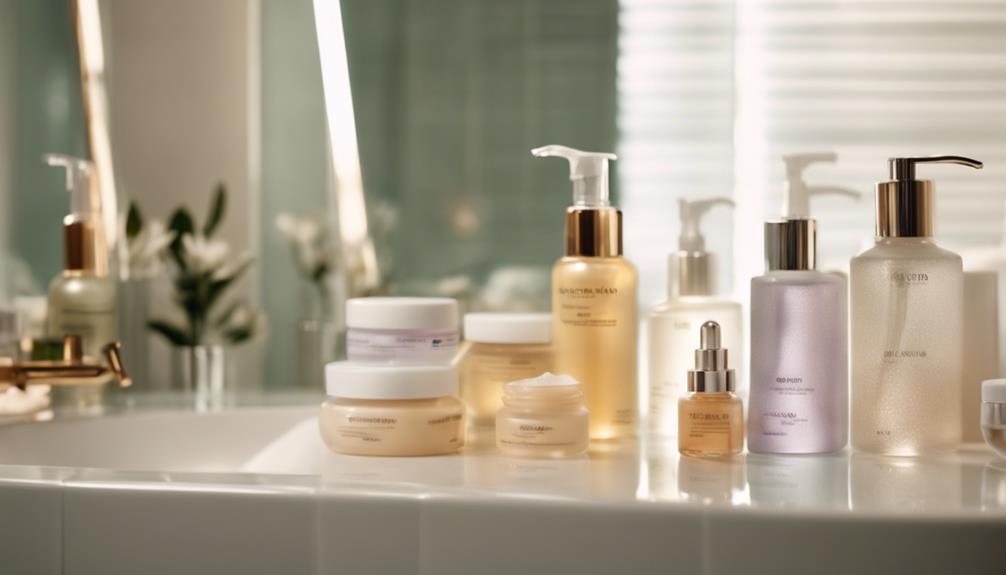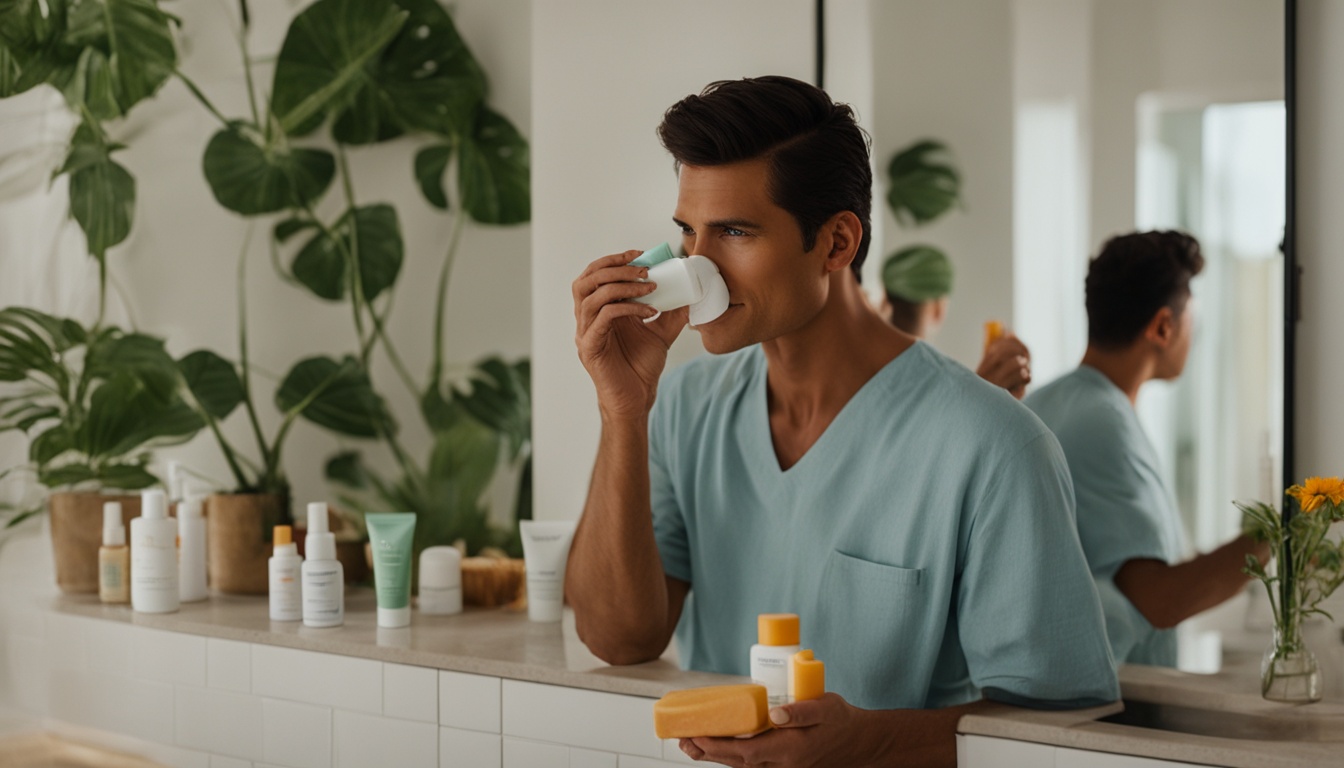To choose the best skincare products, start by identifying your skin type: oily, dry, combination, or sensitive. Each type requires specific products. For example, use oil-free treatments for oily skin and hydrating formulas for dry skin. Always assess your skin's needs and consider key ingredients like hyaluronic acid for hydration and antioxidants for protection. Don't forget to read labels carefully to avoid harmful ingredients and misleading claims. Consistency is essential for effective results. Stick with a routine that suits your skin, and there's much more you can explore to perfect your regimen.
Key Takeaways
- Identify your skin type (oily, dry, normal, combination, sensitive) to select products tailored to its unique needs.
- Assess specific skin concerns such as acne, fine lines, or irritation to guide product choices.
- Choose products with beneficial ingredients like hyaluronic acid and antioxidants while avoiding harmful ones like sulfates and parabens.
- Establish a consistent skincare routine with cleansing, hydration, and protection as fundamental steps for optimal results.
Understanding Your Skin Type
To choose the right skincare products, you first need to understand your skin type, as each type has unique needs and characteristics. There are five primary skin types: oily, dry, normal, combination, and sensitive.
Oily skin tends to produce excess sebum, leading to shine and acne. Dry skin, on the other hand, lacks oil, resulting in flakiness and irritation. If you have combination skin, you may notice an oily T-zone and dry cheeks, which means you'll need different products for varying areas of your face.
Sensitive skin can react negatively to many products, displaying symptoms like redness or burning sensations. This skin type can occur alongside any of the others, so it's essential to choose products carefully.
To effectively understand your skin type, try methods like the blotting sheet test or the 'watch and wait' approach, where you monitor your skin's behavior after cleansing. By accurately evaluating your skin type, you'll be better equipped for choosing the right products tailored to its specific needs, ensuring healthier and more radiant skin.
Identifying Specific Skin Needs

Identifying your specific skin needs is essential for creating an effective skincare routine that targets your unique concerns. Start by evaluating your skin for specific issues like fine lines, acne, or large pores. This guarantees that the products you choose will effectively address your most pressing problems.
Regularly assess your skin condition, since factors like environment, hormones, or stress can alter its needs. You might find that you need to switch to more hydrating products during dry seasons or opt for lighter formulations in humid weather.
Consider your skin type when identifying these needs. For instance, if you have oily skin, look for oil-free treatments that won't clog your pores. On the other hand, if your skin is dry, focus on rich, hydrating formulas that provide much-needed moisture.
If you have combination skin, prioritize products that address multiple concerns without exacerbating issues in either oily or dry areas. Tailor your skincare routine with specific ingredients that cater to these requirements, guaranteeing you're always working towards healthier, more balanced skin.
Fundamental Skincare Steps

To build a solid skincare routine, you need to focus on three fundamental steps: cleansing, hydration, and protection.
Start each day by cleansing your skin to remove impurities.
Then follow up with a hydrating moisturizer to keep your skin supple.
Cleanse Effectively Daily
Cleansing your skin effectively every day is essential for removing impurities and maintaining a healthy complexion. It's the first step in any skincare routine, helping to eliminate dirt, oil, and pollutants without stripping your skin of its natural moisture.
Choose a gentle cleanser suited for your skin type: if you have oily skin, go for gel-based or foaming cleansers with salicylic acid. For dry skin, opt for cream-based, hydrating cleansers that include ingredients like glycerin.
Make it a habit to cleanse twice a day—once in the morning to clear away overnight buildup and again at night to wash off the day's grime. Spend about 30 seconds to 1 minute working the cleanser into your skin, ensuring it's effective without causing irritation. Always rinse with lukewarm water, as hot water can damage your skin barrier.
After cleansing, don't forget to follow up with a moisturizer to maintain ideal hydration levels. This combination of cleansing and moisturizing will keep your skin healthy and balanced, setting the stage for the next steps in your skincare routine.
Hydration Is Key
Hydration plays an essential role in keeping your skin looking youthful and vibrant, as well-hydrated skin maintains elasticity and minimizes the appearance of fine lines.
To achieve ideal hydration, you need to incorporate a quality moisturizer into your routine. Look for products that contain hyaluronic acid, a powerful ingredient that can hold up to 1,000 times its weight in water. This means it's fantastic for boosting moisture retention, making your skin feel plumper and more resilient.
For the best results, apply your moisturizer on damp skin. This helps lock in moisture effectively and enhances your skin's hydration levels. If you have dry or dehydrated skin, consider using a hydrating serum before your moisturizer. This additional layer can provide extra hydration and improve your skin's overall texture.
Don't forget that hydration starts from within, too. Drinking adequate water—about 8-10 cups daily—supports your skin's hydration and contributes to a healthier, more radiant complexion.
Protect Your Skin
Protecting your skin is essential for maintaining its health and preventing premature aging, so make sure to incorporate a broad-spectrum sunscreen into your daily routine.
Look for one with an SPF of 30 or higher, and don't forget to reapply every two hours, especially after swimming or sweating.
Here are three key steps to enhance your skin protection:
- Use Antioxidants: Incorporate products with Vitamin C and E to boost your skin's defenses against environmental stressors, helping to combat free radical damage.
- Build Your Skin Barrier: Regularly treat your skin with active ingredients like retinol to promote cell turnover and improve overall skin resilience.
- Dress for Protection: Wear protective clothing and seek shade during peak sun hours (10 AM to 4 PM) to further safeguard against harmful UV rays.
Key Product Features to Consider

When you're choosing skincare products, it's vital to focus on the essential ingredients that benefit your skin.
At the same time, you need to be aware of ingredients to avoid that can cause irritation or harm.
Let's explore what to look for and what to steer clear of in your skincare routine.
Essential Ingredients to Include
Essential skincare products should include key ingredients that target your specific skin needs while ensuring overall health and balance. Choosing the right essential ingredients based on your skin type and skincare goals can make all the difference in your routine.
Here are three must-have ingredients to take into account:
- Hyaluronic Acid: This powerhouse ingredient boosts hydration, making your skin feel plump and resilient. It's vital for all skin types, especially if you struggle with dryness.
- Antioxidants: Ingredients like Vitamin C and E are your best friends for combating free radical damage. They support overall skin health and help protect against premature aging.
- Broad-Spectrum SPF: A daily SPF of 30 or higher is essential. Protecting your skin from harmful UV rays prevents damage and keeps your skin looking youthful.
Incorporating these essential ingredients tailored to your skin type will help you achieve your skincare goals effectively. Remember, understanding what your skin truly needs is the first step towards a radiant complexion!
Ingredients to Avoid
Avoiding harmful ingredients is essential for maintaining healthy skin and preventing irritation or damage.
When selecting skincare products, it's vital to know the ingredients to avoid, especially if you have sensitive skin or a specific skin type.
First, steer clear of sulfates. These can strip your skin of its natural oils, leading to dryness and irritation.
Parabens are another ingredient to watch out for; they may disrupt your hormones, so always check labels.
Formaldehyde, known as a carcinogen, should be strictly avoided for your safety.
Fragrance is often included in products but can trigger allergies and irritate sensitive skin. Opt for fragrance-free formulations to minimize risks.
Importance of Professional Guidance

Consulting a dermatologist can greatly enhance your skincare routine by providing tailored recommendations that suit your unique skin type and concerns. When you seek professional evaluations, you're not just getting advice; you're gaining insights that can transform your skin health.
Here are three compelling reasons to consult a dermatologist:
- Identifying Underlying Issues: A dermatologist can pinpoint skin conditions that may go unnoticed, allowing for focused treatments that truly address your concerns.
- Personalized Recommendations: With their expertise, dermatologists can suggest specific products and routines tailored to your skin, ensuring you invest in items that actually work for you.
- Ongoing Support: Establishing a relationship with a dermatologist means you'll have a trusted guide as your skin evolves over time, helping you adapt your skincare routine to changing needs.
Ingredient Awareness and Safety

When choosing skincare products, it's essential to know which ingredients benefit your skin and which ones to avoid.
Look for hydrating elements like glycerin and antioxidants, while steering clear of harsh sulfates and parabens that could cause harm.
Beneficial Ingredients to Seek
In your quest for effective skincare, focus on ingredients like glycerin, ceramides, and hyaluronic acid that boost hydration and strengthen your skin barrier. These beneficial ingredients are essential for addressing common skin concerns while keeping your skin moisturized.
Here are three must-have ingredients to look for:
- Glycerin: This powerful humectant attracts moisture to your skin, ensuring it stays hydrated throughout the day.
- Ceramides: These lipids help restore and maintain your skin barrier, preventing moisture loss and protecting against environmental aggressors.
- Hyaluronic Acid: Known for its ability to hold up to 1,000 times its weight in water, this ingredient provides intense hydration and plumpness.
Additionally, consider incorporating L-Ascorbic acid for its antioxidant properties, which help protect against UV damage and promote collagen production.
Tocopherol (Vitamin E) can also enhance your routine by providing synergistic antioxidant benefits.
Harmful Ingredients to Avoid
Steering through the world of skincare requires vigilance, especially when it comes to avoiding harmful ingredients that can compromise your skin's health. Knowing which ingredients to steer clear of is essential for finding the ideal skincare solution tailored to your skin type.
| Harmful Ingredient | Why to Avoid |
|---|---|
| Sulfates | Strip natural oils, causing dryness and irritation. |
| Parabens | Linked to hormonal disruptions, raising health concerns. |
| Formaldehyde | A known carcinogen present in some cosmetics. |
| Fragrance | Triggers allergic reactions, especially in sensitive skin types. |
| Alcohol | Causes excessive dryness and irritation for sensitive skin. |
Importance of Label Awareness
Understanding harmful ingredients is just the beginning; being aware of what's on the label is key to making safe and informed choices for your skincare routine. Label awareness allows you to prioritize beneficial ingredients while steering clear of harmful substances. Here's why it matters:
- Ingredient Order: Ingredients are listed in descending order, so check for beneficial ingredients like hyaluronic acid or antioxidants in the top five. If they're not there, their effectiveness may be compromised.
- Misleading Claims: Products labeled as 'natural' or 'organic' can be deceiving. Always verify the actual ingredients to avoid hidden harmful ingredients such as sulfates, parabens, or formaldehyde.
- Safety First: Patch test new products to identify potential allergic reactions. This step guarantees that you're not only aware of harmful ingredients but also that the product suits your skin type.
Misleading Labels and Claims

Many skincare labels can be deceptive, making it essential for you to scrutinize the ingredient list rather than just trusting buzzwords like 'natural' or 'hypoallergenic.' Misleading claims often dominate packaging, with terms like 'dermatologist tested' offering no real assurance of safety or effectiveness. These terms lack strict regulation, which means they can be used freely without guaranteeing a quality product.
You should pay particular attention to the first five ingredients listed, as they usually account for about 80% of the product's formulation. While brands may highlight one or two 'hero' ingredients, they often obscure common harmful ingredients like sulfates and parabens, which can lead to adverse reactions.
To navigate these misleading claims, familiarize yourself with the ingredients that could be harmful. By doing this, you can make more informed choices about the products you use on your skin.
Always remember, just because a label touts a product as 'natural' doesn't mean it's good for you. Take the time to read through everything, and don't let clever marketing tricks guide your skincare decisions.
Utilizing Resources for Informed Choices

To make informed skincare choices, you can leverage online resources that provide ingredient safety ratings and analyses, ensuring you know exactly what you're putting on your skin. Websites like EWG Skin Deep and CosDNA offer valuable insights, focusing on ingredient transparency.
Here's how you can take control of your skincare:
- Research ingredients: Use online databases to cross-reference product components with safety ratings, reducing the risk of adverse reactions.
- Seek professional advice: Consulting with dermatologists can align your product choices with your unique skin type and concerns, giving you peace of mind.
- Conduct patch testing: Always test new products on a small skin area before full application. It's a simple step that can prevent potential irritation.
Effective Skincare Tips

Effective skincare starts with choosing the right products tailored to your skin type and concerns.
First, cleansing is essential. Use a gentle foaming cleanser if you have oily skin, while cream-based cleansers are better for dry skin. This helps remove dirt and impurities without stripping your skin.
Next, hydration is vital for all skin types. Look for moisturizers that contain hydrating ingredients like hyaluronic acid and ceramides to maintain moisture levels and support your skin barrier.
Don't forget about sunscreen! Daily application of broad-spectrum sunscreen with an SPF of 30 or higher protects against environmental damage and premature aging, no matter your skin type.
Incorporating targeted treatments can also be beneficial. If you're concerned about aging, consider retinol; for acne, salicylic acid can be effective. These targeted treatments address specific skin issues and enhance your overall skin health.
Application Techniques for Best Results

Choosing the right application techniques can considerably enhance the effectiveness of your skincare routine. By applying products correctly, you'll maximize absorption and guarantee your skin reaps all the benefits.
Here are three essential tips to keep in mind:
- Layer Wisely: Always apply skincare in the correct order—cleanser, treatments, moisturizer, and finally sunscreen. This sequence allows each product to penetrate effectively.
- Gentle Touch: When applying moisturizers, use gentle, upward strokes. This not only boosts absorption but also promotes circulation. Avoid harsh rubbing that can lead to irritation.
- Pat, Don't Rub: For serums, use a pea-sized amount and pat it gently onto your skin. This technique guarantees even distribution and prevents wastage.
Don't forget to give each layer about 30 seconds to 1 minute to absorb fully before moving on to the next product.
For an extra boost, consider using tools like jade rollers or gua sha stones after applying your serums. These can enhance penetration and improve lymphatic drainage, leaving your skin looking radiant and revitalized.
Frequently Asked Questions
How to Choose the Right Products for Your Skin Type?
To choose the right products for your skin type, identify your specific needs. Test formulations, read labels, and pay attention to how your skin reacts. Adjust your routine based on changes in your skin's condition.
How Do I Decide My Skin Type?
Your skin's like a landscape; it changes with the seasons. To decide your skin type, wash your face, wait thirty minutes, and observe how it feels—tight, oily, or somewhere in between.
What Are the 4 Types of Skincare?
The four types of skincare are oily, dry, combination, and sensitive. Each type requires specific products to address unique needs, ensuring your skin stays balanced, healthy, and free from issues like irritation or excess shine.
What Are the 5 Main Categories of Skin Care Products?
Did you know 80% of skin aging is caused by sun exposure? The five main categories of skincare products include cleansers, moisturizers, treatments, exfoliants, and sunscreens, each playing an essential role in your routine.
Can I Trust an App to Help Me Choose Skincare Products for My Skin Type?
Looking for skincare products tailored to your skin type? A smartphone dermatologist app treats skin issues by providing personalized recommendations. With advanced algorithms and expert input, you can trust this app to help you choose the right products for your specific needs. Say goodbye to guesswork and hello to healthy, glowing skin.
Conclusion
In choosing the best skincare products for your unique skin type, remember that one size doesn't fit all.
You've got to tailor your routine to what your skin truly needs.
Don't just chase the latest trends—listen to your skin and invest in products that genuinely work for you.
With a little knowledge and the right guidance, you can reveal healthy, radiant skin.
After all, your skin deserves nothing less than the best care it can get!









